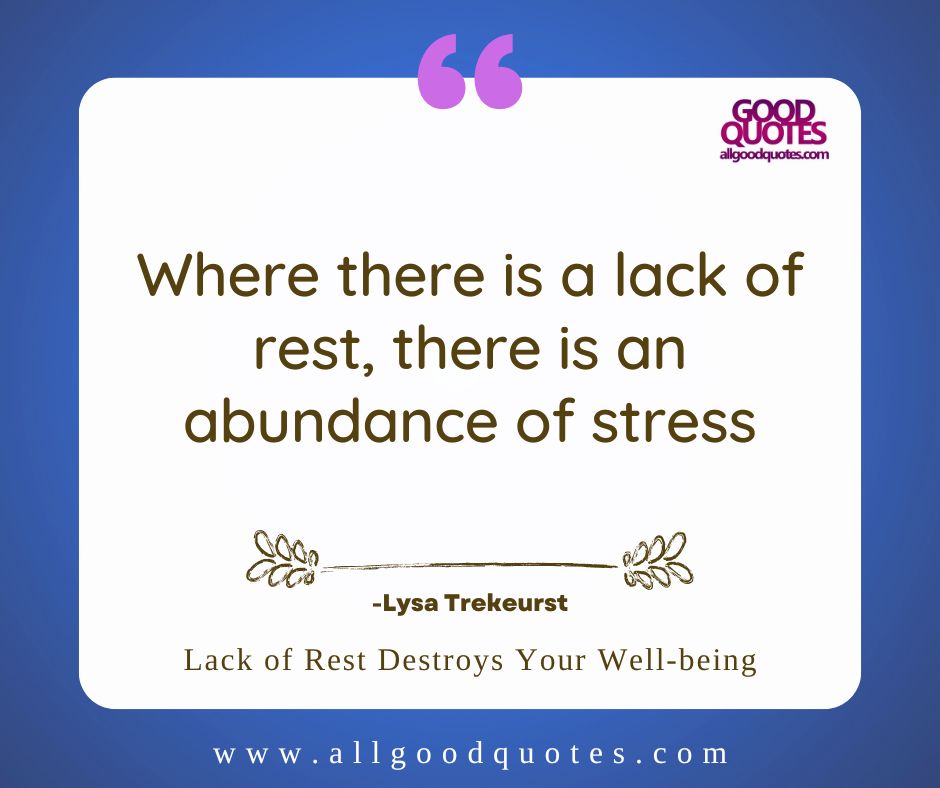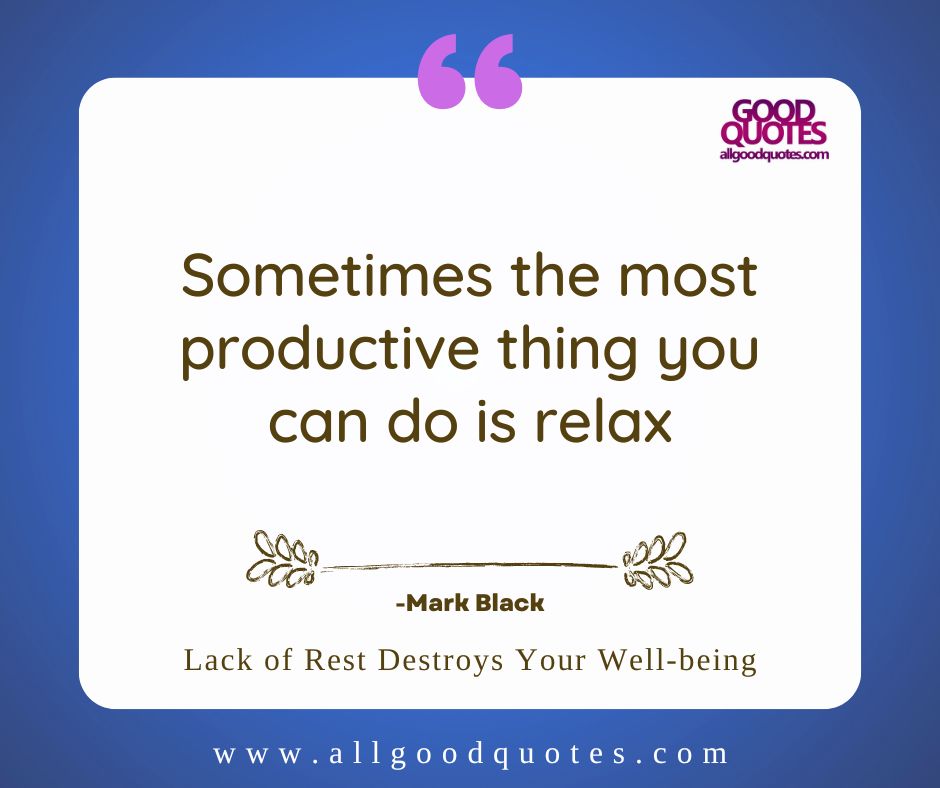Lack of rest happens when someone doesn’t get good sleep. It can impact health, happiness, and focus. It can also weaken the immune system and raise the chance of health issues.
Overworking can cause excessive stress. When we work excessively or work late into the night, it can have a negative impact on our body, leading to stress.
Here are 10 insightful quotes on the importance of rest and the consequences of a lack of it:

Where there is a lack of rest, there is an abundance of stress.
Lysa Trekeurst.
“Fatigue is the best pillow.”
Benjamin Franklin
“Rest and be thankful.”
William Wordsworth
“Take rest; a field that has rested gives a bountiful crop.”
Ovid
“If you get tired, learn to rest, not to quit.”
Banksy

“Sometimes the most productive thing you can do is relax.”
Mark Black
“A good laugh and a long sleep are the best cures in the doctor’s book.”
Irish Proverb
“Rest is not idleness, and to lie sometimes on the grass under trees on a summer’s day, listening to the murmur of water, or watching the clouds float across the sky, is by no means a waste of time.”
John Lubbock
“The best bridge between despair and hope is a good night’s sleep.”
E. Joseph Cossman
“Without enough sleep, we all become tall two-year-olds.”
JoJo Jensen

“Tired minds don’t plan well. Sleep first, plan later.”
Walter Reisch
Age Group Recommended Amount of Daily Sleep
(The CDC Trusted Source recommend)
Infants (0-3 months) 14-17 hours
Babies (4-11 months) 12-15 hours
Toddlers (1-2 years) 11-14 hours
Preschoolers (3-5 years) 10-13 hours
School-aged children (6-13 years) 9-11 hours
Teenagers (14-17 years) 8-10 hours
Young adults (18-25 years) 7-9 hours
Adults (26-64 years) 7-9 hours
Older adults (65+ years) 7-8 hours
The Consequences of Lack of Rest
Effects of Poor Physical Health: –
Weakened Immune System:
Not getting enough sleep can weaken the immune system, making it harder to fight off illnesses.
Weight Gain and Obesity:
Lack of sleep can mess with hormones that control hunger, making you crave unhealthy foods and increasing the chances of gaining weight.
Heart Disease and Diabetes:
Chronic sleep deprivation can raise the risk of heart disease, high blood pressure, and type 2 diabetes by affecting metabolism and causing inflammation.
Impaired Physical Performance:
Sleep deprivation can affect coordination, reaction times, and motor skills, making accidents and injuries more likely.
Also Read: 10 Golden Words for Life
Effects on the Mind and Emotions from Lack of Rest:
Memory and Learning:
Getting enough sleep is important for memory, learning, and problem-solving. People who don’t get enough sleep may have trouble concentrating and be less productive.
Mood Swings:
Not getting sufficient sleep regularly can lead to changes in mood, irritability, anxiety, and even depression. Sleep helps regulate the chemicals in the brain that affect mood.
Stress Levels:
Having a good night’s sleep is crucial for the body to recover from daily stress. People who are sleep-deprived are more likely to feel stressed and struggle to deal with challenges.
Mental Health Risks:
Long-term lack of sleep can increase the chances of developing mental health issues like depression, bipolar disorder, and anxiety disorders.
Healthy Sleep Recommendation from lack of rest
When you feel like you’re not getting enough sleep, there are several things you can do to improve your sleep quality.
1. Prioritize your sleep:
Sometimes, we neglect our sleep due to our lifestyle choices, leisure activities, and other obligations. It’s important to make sleep a priority.
2. Stick to a consistent sleep schedule:
Try to go to bed and wake up at the same times every day, even on weekends. This helps regulate your body’s internal clock and promotes better sleep.
3. Allocate enough time for sleep:
Make sure you give yourself sufficient time to get the recommended amount of sleep each night.
4. Establish a bedtime routine:
Having a calming and consistent routine before bed can help signal to your body that it’s time to sleep.
If possible, make your bedroom comfortable, with cozy bedding, a suitable room temperature, and minimal noise and light.
6. Get sunlight exposure:
Exposing yourself to natural sunlight during the day can help regulate your circadian rhythm, making you more alert during the day and promoting better sleep at night.
Regular exercise can improve the quality of your sleep and help establish a healthy sleep schedule.
8. Avoid sleep disruptors:
There are certain things you should avoid to ensure a good night’s sleep.
– Caffeine: Try to avoid consuming caffeine before bedtime, as it can make it harder to fall asleep and stay asleep.– Electronic devices: Limit the use of electronic devices, such as TVs and smartphones, before bed, as the blue light emitted by these devices can interfere with your sleep.
Conclusion about lack of rest:
Getting enough quality sleep is essential for maintaining good health and well-being. By following these tips for healthy sleep, you can develop restful and revitalizing sleep habits that support your body, mind, and spirit. Remember, prioritizing sleep is an investment in your overall health and energy.

